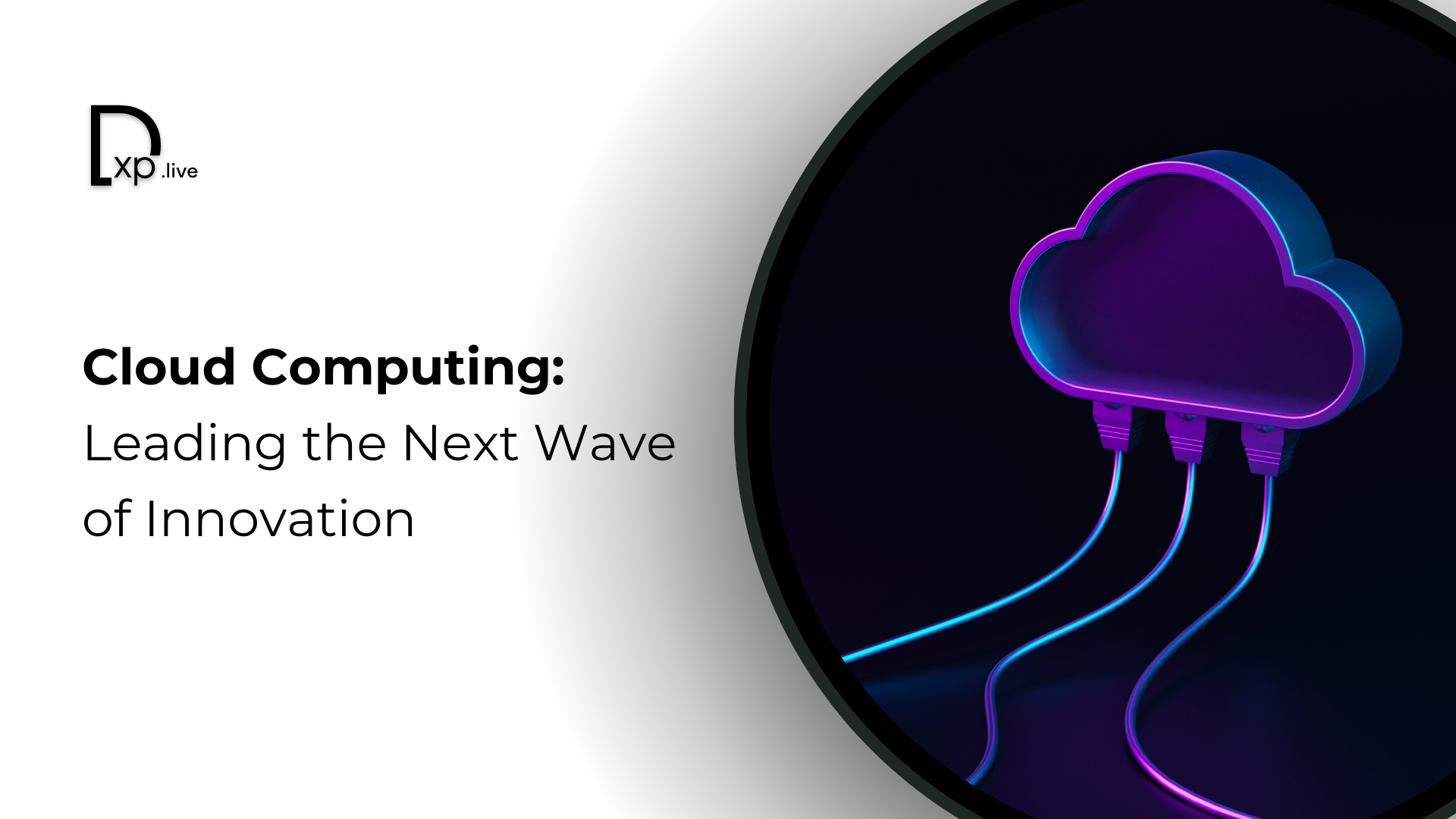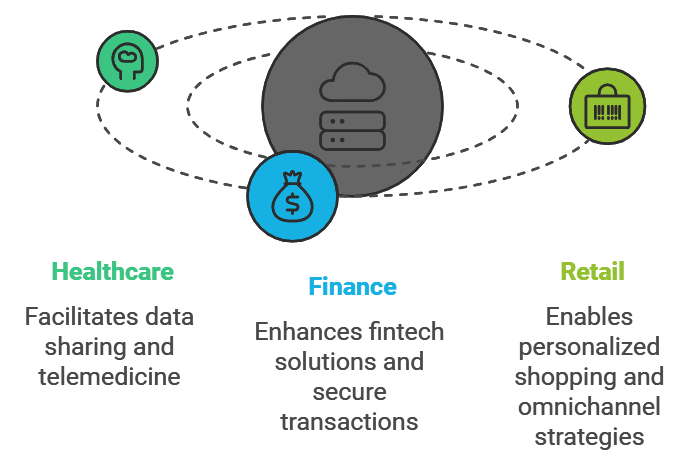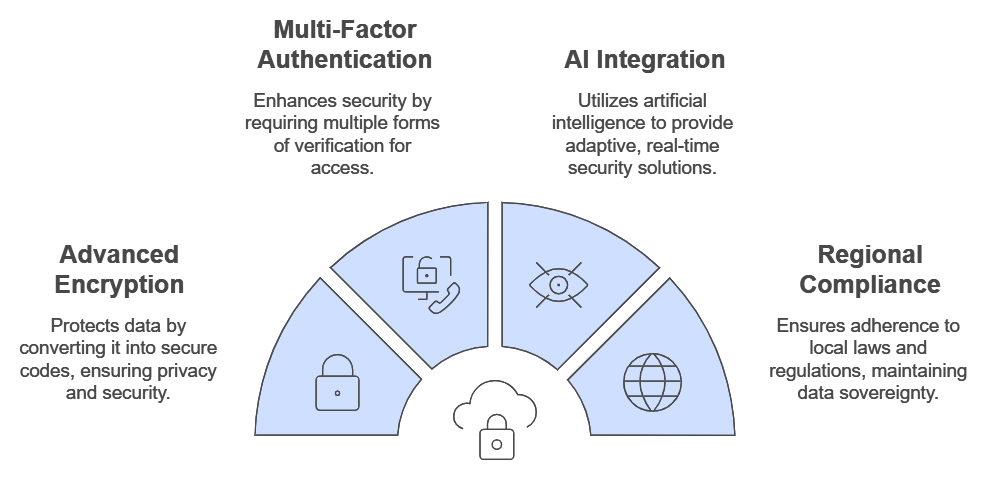Cloud Computing: Leading the Next Wave of Innovation

Cloud computing is changing the way we do things in business and has very large growth, with estimates showing 20.4% growth in the global cloud services alone in the year 2024. This in turn marks a change in the technology adoption pattern by businesses, given the fact that 94% of enterprises have adopted cloud solutions as part of their digital transformation strategy. The faster pace of adopting the cloud, particularly among businesses is not only to improve their efficiency level but also to increase innovative rounds of various sectors such as healthcare, financial, manufacturing, and retail. Cloud computing has become a necessity for the advancement of technology by allowing for real-time data processing, unitary channels, and the development of superstructures. As the adoption of cloud technology improves in businesses, there is improvement in operational range and works which is revolutionary for the scope of the digital sphere.
Why Cloud Computing Fuels Innovation
Cloud computing fuels innovation by providing unmatched scalability and flexibility. With cloud scalability, companies can instantly adjust resources based on demand, streamlining development cycles and minimizing costs. Instead of investing heavily in physical infrastructure, businesses leverage a flexible cloud infrastructure that adapts to evolving needs, enabling faster innovation without the burden of upfront expenses.
Additionally, cloud services enhance global collaboration and accessibility for remote and hybrid teams. Cloud-enabled tools allow team members from different locations to seamlessly collaborate on projects, making it easier to share ideas and refine solutions in real time. This global collaboration cloud model accelerates problem-solving and drives forward-thinking innovations, as diverse perspectives come together more efficiently. For industries facing constant change, such as tech and healthcare, these collaborative capabilities are essential. Cloud computing thus creates a fertile ground for innovation, connecting teams, scaling resources, and adapting infrastructure to match the pace of market demands.
Key Sectors Transformed by Cloud-Driven Innovation

Cloud computing is reshaping key sectors, driving digital transformation and innovation at scale. In healthcare, the cloud facilitates seamless data sharing, enabling telemedicine, electronic health records (EHR), and advanced diagnostics. By storing and managing patient data on the cloud, healthcare providers gain real-time access to critical information, which supports faster, more accurate care decisions and enhances patient outcomes.
In finance, the cloud accelerates the development of fintech solutions, from digital wallets to AI-powered fraud detection. By leveraging cloud infrastructure, financial institutions can process vast amounts of data securely and efficiently, enabling real-time transactions, predictive analytics, and personalized banking experiences.
Retail is also experiencing cloud-driven transformation, where real-time data processing allows businesses to offer personalized shopping experiences. Cloud-powered omnichannel strategies provide consistent customer journeys across online and in-store platforms, while inventory management and customer data analytics help optimize operations and increase engagement.
The cloud’s impact across healthcare, finance, and retail highlights its role in modernizing industries through scalability, innovation, and agility, proving essential for businesses aiming to thrive in a digital-first world.
Cloud and Emerging Technologies: A Symbiotic Relationship
Cloud computing plays a transformative role in accelerating emerging technologies, creating a symbiotic relationship that drives innovation across industries. With cloud AI and machine learning (ML), cloud platforms deliver the computational power, scalable storage, and accessibility required to support complex algorithms and large data sets, advancing AI-driven applications across healthcare, finance, and more.
In the realm of cloud IoT, cloud computing enables the seamless management of massive amounts of data generated by IoT devices. This capability is crucial for powering smarter cities, industries, and homes, where data insights help automate and optimize functions.
For cloud blockchain innovation, cloud infrastructure serves as a reliable, scalable environment, addressing blockchain’s storage and processing demands, thus facilitating faster and more secure transactions and decentralized applications. Together, cloud and emerging technologies enhance each other, forming a foundation for rapid digital transformation that redefines modern business and connectivity standards.
Cloud Computing's Role in Accelerating Startups and Entrepreneurship
Cloud computing has established itself as a vital asset for startups and entrepreneurs in terms of cost and flexibility. With the use of cloud computing, the requirement of making hefty investments in servers, devices, and system integration gets eliminated. Thus, more focus for cloud startups can be directed towards business growth than being concerned with IT infrastructural elements.
To make matters better, cloud computing also enables startups to use various high-powered machines and services as and when required. For instance, the cloud can facilitate rendering for complex simulations, machine learning, as well as big data analysis. Once regarded as the privilege of large-scale corporate structures due to the costs involved, these technologies are now put in the hands of entrepreneurs allowing them a faster and more effective means of innovating.
The ability of entrepreneurs to rapidly redeploy their business operations without incurring substantial costs leads to cloud entrepreneurship. This shift in the landscape of technology also helps startups adapt and scale without being held back by tradition and allows them to spearhead innovation in the cloud business space.
Security and Compliance: Overcoming Challenges for Innovation

With the changing nature of threats, the importance of cloud security has also shifted. It has become vital to revolutionize the field through innovation. Today, the focus is on securing environments with the combination of effective and cutting-edge measures. This includes developing advanced encryption systems, utilizing multi-factor authentication, and integrating AI to offer real-time solutions that rapidly adapt to changing vulnerabilities. With the aforementioned in place, cloud infrastructure is easy to implement, granting room for progression without complete breaches of data security.
In addition to that, the entire region's laws are respected due to cloud compliance. There's no need to worry about data sovereignty since different regions have their own providers. Therefore, regardless of where the information is needed most, the requirements for international compliance will be fulfilled. This fosters more companies to be compliant allowing them to move into cloud technologies as the requirements for the regions are addressed.
Because of these advancements in cloud technologies, businesses are able to push boundaries in an era that heavily relies on security and compliance. It builds great trust and reduces the risks as new innovations are introduced in the market.
The Future of Cloud-Driven Innovation
That cloud is the answer to many business challenges can hardly be overemphasized. Especially when the future is brightened with developments such as green cloud initiatives, 5G technology advancements, and the continuous transition towards a hybrid/multi-cloud approach. In other words, this is where businesses of various scales and sectors gain greater flexibility and enhance control over the inherent risks. It is hardly surprising that ozone comes first with hybrid solutions allowing a business to implement both private and public cloud environments. Meanwhile, these multi-cloud strategies do not just solve the vendor lock-in issue with a single provider, they also make more operable how workloads are distributed depending on cost and performance metrics.
With companies striving to reduce the harmful impact of construction on the environment, green cloud solutions are beginning to gain traction. These initiatives aim at minimizing the data center's carbon footprint through the use of intelligent and energy-efficient technologies along with clean energy sources while upholding the environmental aims of the world.
New applications and services are certain to be provided as the new cloud potential will be offered by the implementation of 5G networks. The potential of 5G is tremendous, real-time processing with such a low latency in data transfer opens new horizons for many IoT-related industries like healthcare, smart cities, or even autonomous vehicles.
Incorporating a hybrid cloud future, green cloud solutions, and 5G cloud innovation ensures organizations stay ahead in this evolving landscape.
In summary, cloud computing continues to be a cornerstone for technological innovation across industries. By providing scalable infrastructure, enhanced flexibility, and seamless collaboration, cloud platforms empower businesses to develop cutting-edge solutions. From artificial intelligence to IoT, the cloud enables rapid experimentation and deployment of new technologies. As cloud services evolve, they will further drive advancements in automation, data analytics, and digital transformation, reinforcing their role as a key catalyst in shaping the future of innovation.
Be at the forefront of technological innovation! Join our vibrant community to unlock expert insights, exclusive content, and the latest news on AI, IoT, and cutting-edge retail solutions. Stay informed, get inspired, and be part of the conversation—subscribe digitalexperience.live today for your gateway to the future!
FAQs
1. How does cloud computing drive innovation?
Cloud computing enables businesses to access scalable resources and powerful technologies, allowing for faster experimentation, development, and deployment of innovative solutions without heavy upfront investment.
2. What are the main benefits of cloud for innovation?
Cloud offers flexibility, cost-effectiveness, and access to advanced technologies like AI and big data analytics, enabling businesses to quickly adapt and drive innovation in products and services.
3. Can cloud computing support emerging technologies?
Yes, cloud computing supports emerging technologies such as AI, machine learning, and IoT by providing the computational power and tools needed to develop and scale these technologies efficiently.
4. Is cloud computing essential for digital transformation?
Yes, cloud computing is critical for digital transformation as it provides the infrastructure, agility, and collaboration tools businesses need to innovate and modernize operations.



